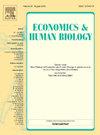When the thermometer rises, the scales tip: Extreme temperature exposure and obesity
IF 1.8
3区 医学
Q2 ECONOMICS
引用次数: 0
Abstract
Obesity is a global public health issue, with over 1.9 billion adults reported to be either overweight or obese. Despite the high financial and health costs associated with obesity, the global prevalence of obesity across all age groups has been on the rise. Using the Household, Income and Labour Dynamics in Australia (HILDA) Survey, we provide evidence of the causal relationship between extreme temperature exposure and obesity. We show that there is a positive association between high temperatures (above 30) and obesity. Specifically, an additional day of exposure to temperatures above 30°C in a year is associated with a 0.02 percent increase in BMI and a 0.2 percent increase in the probability of being obese. We find these effects to be pronounced for older cohorts, and robust to alternative specifications and falsification of our extreme temperature exposure measure. We provide evidence that the underlying mechanisms for our baseline relationship are reduced physical activities and low internal locus of control due to extreme temperature exposure.
当温度计上升时,天平倾斜:极端温度暴露和肥胖
肥胖是一个全球性的公共卫生问题,据报告有超过19亿成年人超重或肥胖。尽管与肥胖相关的经济和健康成本很高,但全球所有年龄组的肥胖患病率一直在上升。利用澳大利亚家庭、收入和劳动力动态(HILDA)调查,我们提供了极端温度暴露与肥胖之间因果关系的证据。我们表明,高温(30°C以上)与肥胖之间存在正相关。具体来说,一年中在30°C以上的温度下多暴露一天,体重指数就会增加0.02%,肥胖的可能性就会增加0.2%。我们发现这些影响在年龄较大的人群中是明显的,并且对我们的极端温度暴露测量的替代规格和伪造是稳健的。我们提供的证据表明,我们的基线关系的潜在机制是由于极端温度暴露导致的身体活动减少和内部控制点降低。
本文章由计算机程序翻译,如有差异,请以英文原文为准。
求助全文
约1分钟内获得全文
求助全文
来源期刊

Economics & Human Biology
医学-公共卫生、环境卫生与职业卫生
CiteScore
4.50
自引率
12.00%
发文量
85
审稿时长
61 days
期刊介绍:
Economics and Human Biology is devoted to the exploration of the effect of socio-economic processes on human beings as biological organisms. Research covered in this (quarterly) interdisciplinary journal is not bound by temporal or geographic limitations.
 求助内容:
求助内容: 应助结果提醒方式:
应助结果提醒方式:


